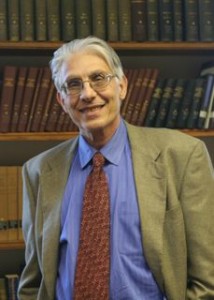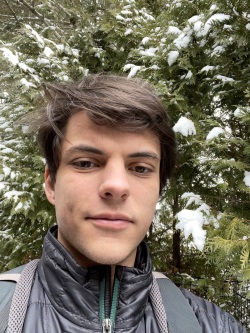 To commemorate the 75th anniversary of diplomat George Kennan’s “Long Telegram,” the Wilson Center’s History and Public Policy Program published an essay by UConn History’s own Board of Trustees Distinguished Professor Frank Costigliola. Professor Costigliola edited 2014’s The Kennan Diaries and published articles and essays about Kennan’s decades-long relationship with Russia and the Soviet Union. His essay, “My Voice Now Carried”: George F. Kennan’s Long Telegram,” is an excerpt from Professor Costigliola’s forthcoming book on Kennan. You can find Professor Costigliola’s excellent essay at the Wilson Center’s Sources and Methods blog.
To commemorate the 75th anniversary of diplomat George Kennan’s “Long Telegram,” the Wilson Center’s History and Public Policy Program published an essay by UConn History’s own Board of Trustees Distinguished Professor Frank Costigliola. Professor Costigliola edited 2014’s The Kennan Diaries and published articles and essays about Kennan’s decades-long relationship with Russia and the Soviet Union. His essay, “My Voice Now Carried”: George F. Kennan’s Long Telegram,” is an excerpt from Professor Costigliola’s forthcoming book on Kennan. You can find Professor Costigliola’s excellent essay at the Wilson Center’s Sources and Methods blog.
Month: February 2021
Virtual London Internship – Maxwell Goldstein ’22

Maxwell Goldstein, ’22, a student double majoring in Anthropology and History, was amongst the first students to participate in the Virtual London Internship program this fall. We recently caught up with him to learn more about why he decided to participate in vitual programming and what the experience offererd him during a unique time globally, and in his final academic year at UConn.
“The Fall 2020 semester was definitely an interesting one and given that I was at home for it without any classes to attend in person, I wanted to do some additional work to keep me busy, as well as padding out my resume.”
Max also saw value in applying his academic learning to real world experience with an internship. “Academically, I could not have asked for a more appropriate experience. I was allowed to explore a version of what I had already been doing throughout my undergraduate coursework at UConn, and this came with different opportunities and challenges that were not present in the structured environment of a classroom. Another consideration is that it looks good on a resume, that you were willing and able to take on additional responsibilities in such a tumultuous period of time.”
Maxwell knew that there would be challenges that came with this experience. He explains, “I think the internship that I took part in helped me to continue to do my best work even with all the irregularities and issues that this semester put forth. It kept me to a schedule, and with the way fall 2020 played out, I think having that responsibility to other people, not just yourself, was important.”
When asked what advice he had for prospective students who weren’t sure about participating in a virtual internship experience, Maxwell replied, “Talk to your advisors; its their job to help you out. If you are concerned with getting an internship that meshes well with your chosen major, I wouldn’t stress too much. I am an Anthropology & History major, and if I could get an internship in History, I am sure that you can get an internship that aligns with your interests. Additionally, if you are unsure about your major, this can be an opportunity to really get a feel of what it would be like in the real world, which can help inform your future undergraduate studies at the University.”
So what’s next for Max? “I really enjoyed the work that I did over the course of the internship, and would love to participate more in this regard. I think it would be impossible to say that this internship hasn’t influenced my future plans at all; it’s provided me the expectations that I will have for future opportunities, and how I should approach them.”
For more information, contact: Education Abroad at abroad@uconn.edu
Nancy Shoemaker Profiled for Authors in Conversation Series
H-SHEAR (the network for historians studying the early American republic, during the period 1775 to 1860), in association with Cornell University Press, will hold a U.S. in the World Series Authors in Conversation event, “National Imaginaries and Identities in the Global 19th Century.” The event is a discussion of The Greek Fire: American-Ottoman Relations and Democratic Fervor in the Age of Revolutions, by Maureen Santelli, and Pursuing Respect in the Cannibal Isles: Americans in Nineteenth-Century Fiji, by UConn History’s own Professor Nancy Shoemaker. Santelli and Shoemaker will be joined by Judy Tzu-Chun Wu.
The conversation will happen on Friday, March at 12 PM EST. It will occur on Zoom and you must register to attend. You can do so here.
Frances Martin and Megan Streit Win Dissertation Research Grants
When one UConn History student wins a prestigious dissertation grant, that’s great news. But when two students win the award, well, that’s just another sign of the caliber of history graduate students here at UConn.
Please join us in congratulating Frances Martin and Megan Streit on winning Samuel Flagg Bemis Dissertation Research Grants from the Society for Historians of American Foreign Relations (SHAFR). SHAFR is the premier academic organization for diplomatic historians and foreign relations history. The competition for SHAFR grants is competitive as candidates from all over the world vie for a select number of grants.
These grants are the latest honors for Frances and Megan as they complete their respective dissertations. Well done, Frances and Megan, and continue making UConn History proud.
Manisha Sinha Articles Published by CNN and NY Review of Books
 UConn History’s own Professor Manisha Sinha is no stranger to having her work appear in print and read by large audiences. But this week, Professor Sinha had articles published in not one, but two places: CNN and The New York Review of Books.
UConn History’s own Professor Manisha Sinha is no stranger to having her work appear in print and read by large audiences. But this week, Professor Sinha had articles published in not one, but two places: CNN and The New York Review of Books.
On Monday, February 1, CNN published Professor Sinha’s thoughts about Amanda Gorman’s inauguration poem, “The Hill We Climb,” and how to her, it summoned the story of enslaved early American poet, Phillis Wheatley. Professor Sinha explored Wheatley’s remarkable story, criticisms Gorman and her poem have received, and the ugly history of denying Black women access to the mainstream literary canon. Professor Sinha explained this dark history but also revealed that Gorman and her work beautifully captured the unending yet hopeful Black struggle for acceptance in American democracy.
Then on Wednesday, February 3, The New York Review of Books published Sinha’s “The Case for a Third Reconstruction.” In her essay, Sinha argued that the American Republic is always in danger whenever white supremacist sedition and violence is not confronted and defeated.
We encourage you to read both of Professor Sinha’s articles and share with friends.